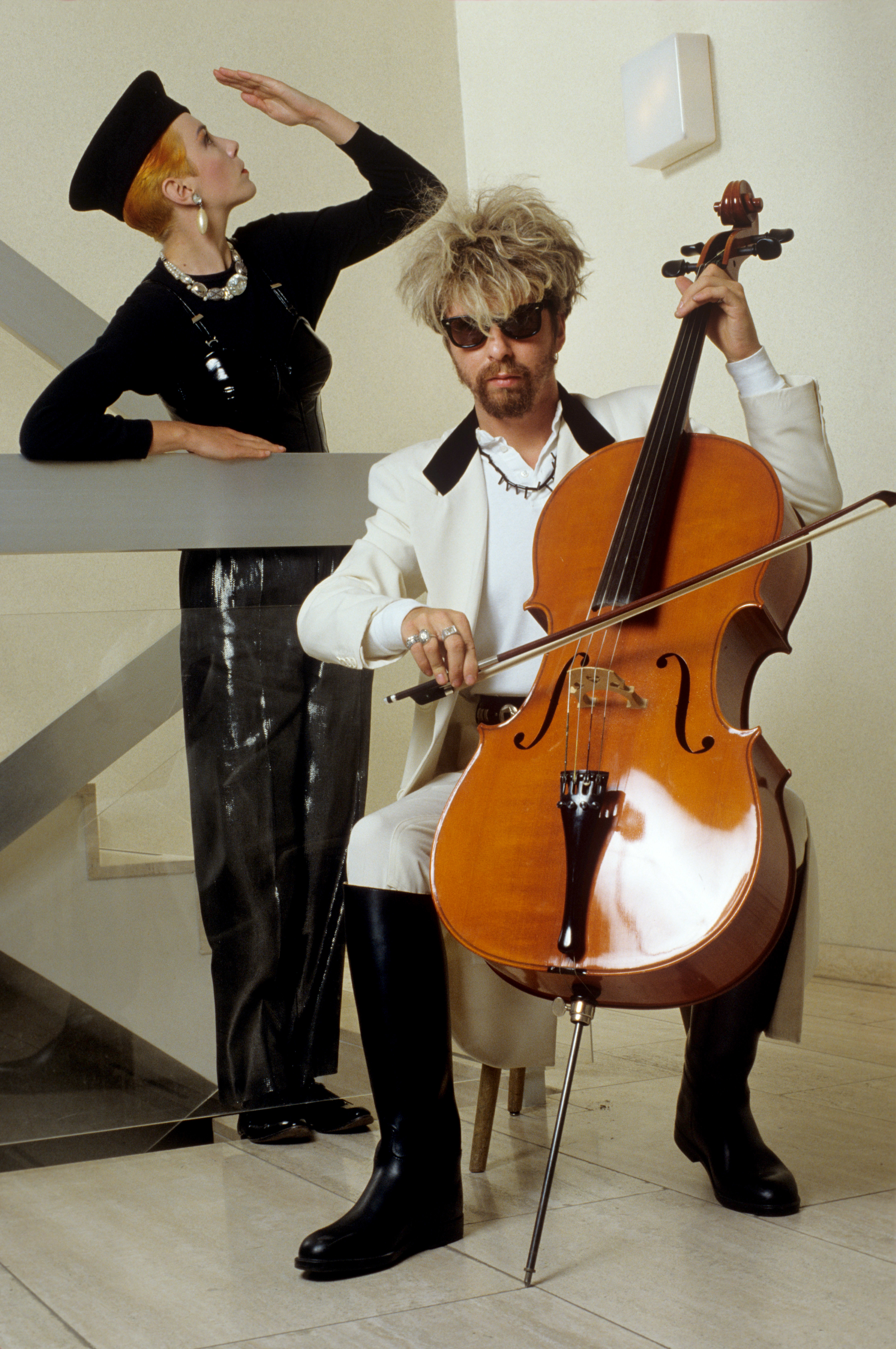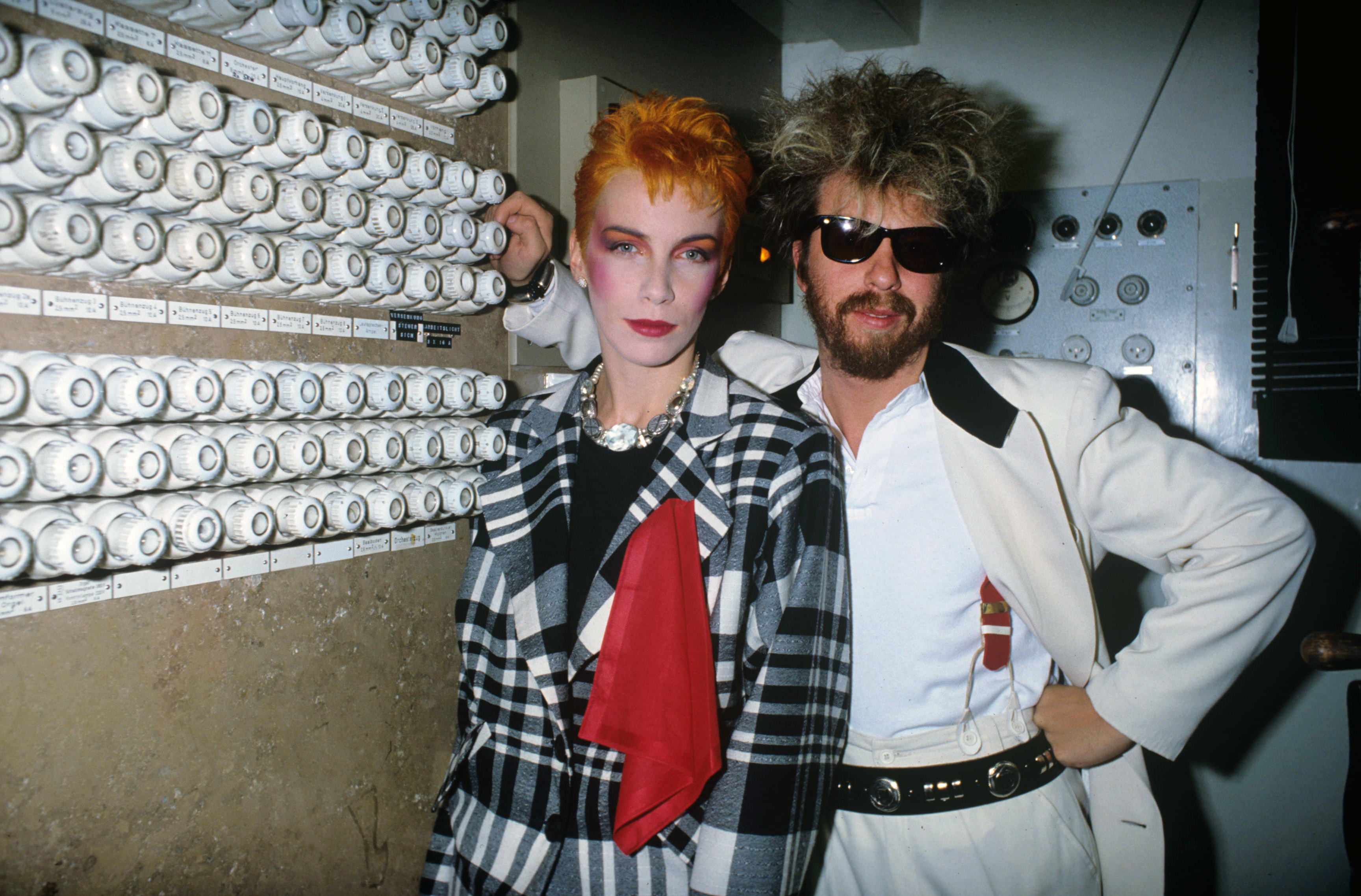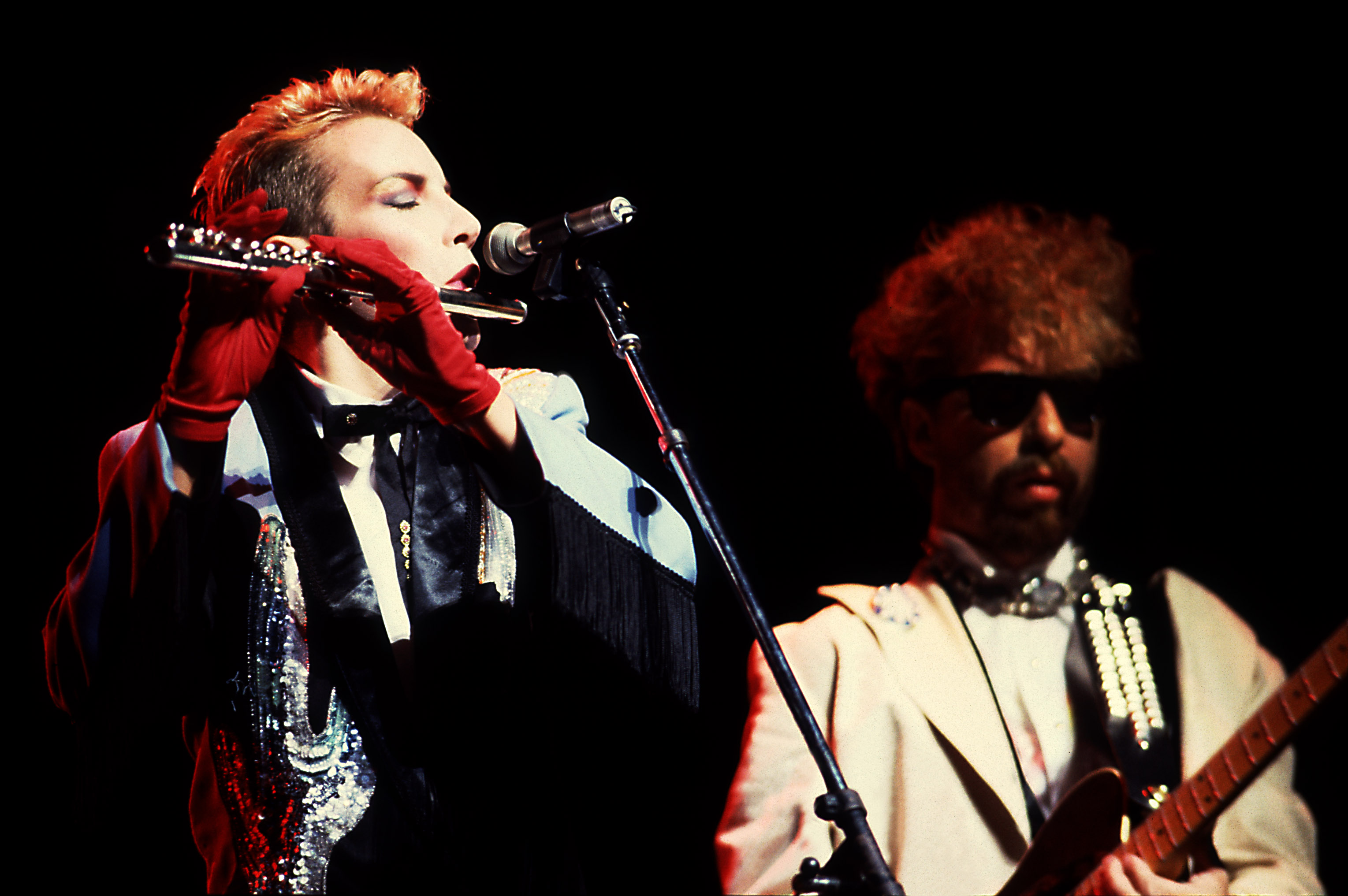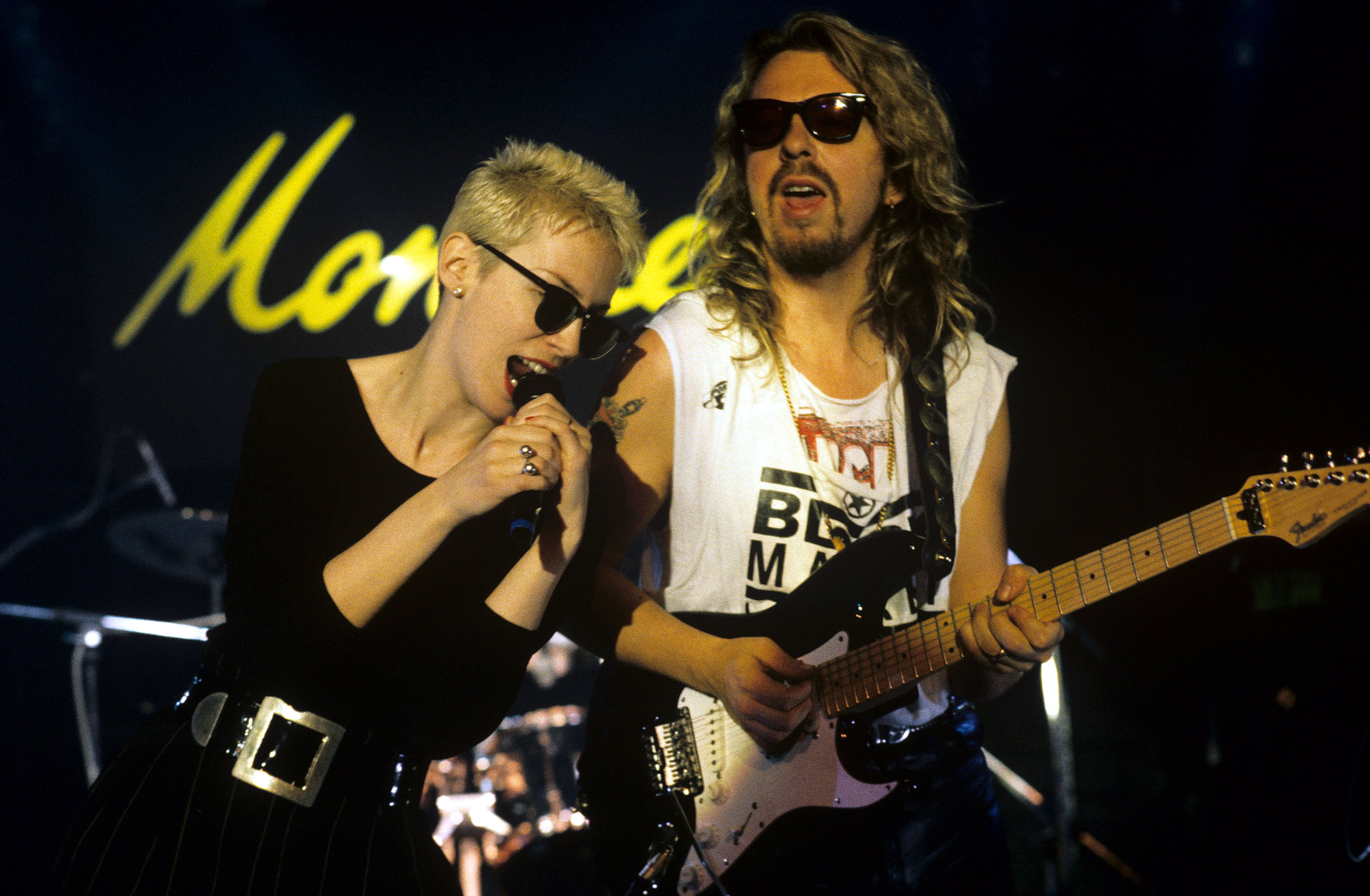This article originally appeared in the August 1985 issue of SPIN.
The day Be Yourself Tonight lay tightly canned and set for the presses, Dave Stewart phoned Annie Lennox: "The funny thing is, Annie, I feel we've only just scratched the surface."
"Me too," she replied. "I've got so much more. Where shall we go now?"
Their latest LP was the fourth official Eurythmics release, discounting an unhappy remix of their state-of-the-art Touch album and the 1984 sound track, and their approach was still one of charming, pumping and seemingly naive enthusiasm.
"I wake up in the mornings now and just feel so good about everything," Lennox continued to Stewart. "I just think: 'Exciting! Exciting!'"
Stewart remembers another phone call from unhappier times. "Annie rang me up about four years ago and she was crying and all over the place. She'd been to a club in town and it was full of Blitzy London people. She'd forced herself to go along to keep up with what was happening. She stood on her own for ages and then she started crying. Eventually someone came over, I can't remember who…"
"It was Boy George," confirms Lennox. "The George who'd come to Tourist [the Eurythmics previous incarnation] concerts as a young lad—when he was only about 15. He came over and I thought it was funny that the one who looks most extreme is actually the least of a poser. You know, people like us have gone through an awful lot of feeling exterior, of feeling very alienated. Actually we never could join in with the crowd."
[caption id="attachment_id_336513"]  Fryderyk Gabowicz/picture alliance via Getty Images[/caption]
Fryderyk Gabowicz/picture alliance via Getty Images[/caption]
Lennox wrote a song around that time called "Never Gonna Cry Again," but life refused to imitate art; the crying continued for years, continues still. Three years after their heart-to-heart in that club she and George shared a Newsweek cover—success!—but she was still far from happy. Her wailing bouts have been very public, well-oiled affairs. As sensitive as she is, and as much as her life is seemingly lived in a fish bowl, she is strong and refuses to drown in those tears.
When "Sweet Dreams" propelled the Eurythmics into universal stardom, the public by and large got the mistaken impression that the group were overnight sensations. Untrue. The Sweet Dreams (Are Made of This) LP was the second—and first American release—for the Eurythmics, but number six for the Annie Lennox/Dave Stewart musical partnership (four others were released as the Tourist and In the Garden was the Eurythmics debut).
Neither has it been smooth all the way. But now here she is with Stewart, philosophical and confident as hell again, both of them backlit by the sun on the balcony of a pricey rented apartment overlooking London's fashionable Montagu Square.
"I've never felt more in control," she asserts as her lawyer and manager haggle over fine points in the next room. "Well, not in control exactly, but I can see things more clearly now. Like all the chaotic things can actually be turned around to something so useful. And I'm not afraid as I was; I was very anxiety-ridden."
Certainly she can afford to put a brave face on it all now—the new album has swiftly made up for any ground lost over the last 18 months, her name is hot and splashed into the hippest conversations again, and she's fighting off interview requests by the bucketload—but she stresses that more substance lies in her claims of self-confidence than before. This, Lennox says as she chomps into a plate of steaming beans on toast, is the real me. Unmasked and wig-free. No personal question unanswered.
Lennox was 30 last Christmas Day, but she looks younger now than on some of her dark, slightly rebellious Tourist poses of six years ago. She's togged out in a close-cut shiny black vest and apparently seamless and pocketless black trouser-tights (someone must have recently confirmed that she looked great in black). Her hair is bleached pale yellow and white at curly top and shaven sides, she sports a pinkish eye-shadow-and-lip-stick combo, and a long bulbous, globular metallic necklace winds loosely many times around her throat.
Thick gold earrings are here, too, but they're worn by Dave Stewart. He's got a granddad vest dyed grey, old jeans, and the patented light-brown straggly mop top tied into a tight ponytail at the back. The wayward beard hasn't changed much either (someone must have once told him he looked good in hair).
https://youtu.be/RCdneDxFRYQ
Their accents have thinned since he left Sunderland and she Aberdeen, in northern England and Scotland respectively, but both still hang in there somewhere. As does a rather staggering passion for honesty and confession.
"Annie's one of those people like a pressure cooker," offers Stewart. "You ring her up one day and she's doing everything, then the next…"
It's just something I have to deal with," Lennox explains. "I am a very extreme person. Obviously someone that performs and writes music like that and does the things that I do is not going to be exactly the most even-keel person in the world. I have been prone to a great deal of very bad depression. I've suffered from a history of depression which I hope that as I get older, I come more and more to terms with."
"It's like an adolescent depression that you get when you're about 15, and it never quite leaves you. It's always there and it's also been the source of my creativity as well to a great degree; at least in the sense that I sense this awful sort of angst and greyness about existence. Part of the reason why I've ever written songs was to deal with that, to express what was inside, which was just something so awful."
Interjects Stewart, "Annie once came to me and said, 'I've written this song on my own and it's called "Depression" and I'm going to play it!' I told her that it wasn't that I didn't think it was any good, it was just that I didn't fancy going round singing it."
So it must say something about the current state of Lennox's churning innards that the new albums is a brash and sturdy upbeat pumper, optimistic. The grim traces are visible still—"Here Comes That Sinking Feeling" asks, "Have you ever heard the sound of disappointment? / It pounds in your head like hammer blows / …and it likes to leave a scar"—but they are fiercely outnumbered by the assertive "Would I Lie To You?", "Conditioned Soul," "There Must Be an Angel," and the Aretha Franklin duet "Sisters Are Doin' It for Themselves," on the surface apparently a feminist call to arms.
"I suppose that song's feminist in the sense that it's women singing about women," shrugs Lennox, "but it's really just a song for people in a situation like mine, people who now do things through their own assertion, through their own power, that they would never have been able to do before."
[caption id="attachment_id_336516"]  Fryderyk Gabowicz/picture alliance via Getty Images[/caption]
Fryderyk Gabowicz/picture alliance via Getty Images[/caption]
Stewart opines that if "Sisters" is released as a single, "It will almost be a special event. It's a statement that's never been made in a commercial pop song before." He hopes it will go some of the way to restoring the equilibrium upset by all those heavy-metal groups with their anthem-like "I'm a man! And I'm gonna rock you, honey!"
"You really have to hope for that potential," says Lennox. "Like there are millions of women and we're all in the same boat. When you go to a women's sauna, everyone's there with their clothes off and it's all evened out. You see fat women and they look great because they're not all bulged into their clothes; you see the ones with bad scars from lots of childbearing; you see the trendies and the beautiful and tanned ones. But when the clothes go back on you get all those barriers again—and I mean women versus women. There's still too much competition."
As a whole, Be Yourself Tonight is the logical musical progression of a partnership that has strengthened and advanced.
* * *
What began as a bluff of tough lyrical stance and Euro synth-pop derivations in their early Tourist days (most of it written neither by Lennox nor Stewart) stretched into the lighter, roomier, more considered and slightly psychedelic feel of Eurythmics, and was further upgraded by Lennox's Tamla-influenced vocal conviction from Sweet Dreams onward. (Lennox had spent most weekends as a young girl in Aberdeen dancing to Motown, but she swears she didn't know what that was until Stewart told her at the start of the Sweet Dreams sessions.)
Stewart's production work—recently extended to the Ramones and Tom Petty—and Lennox's classical music leanings further broadened their sound. (In the early '70s, Lennox passed three years tooting flute at London's Royal Academy of Music, where she felt distinctly unfulfilled: "All the boys were gay and all the girls thought they were Maria Callas.")
Their newfound strength crosses over to their business dealings, and like most bands at this stage in their career, it's strength through experience: a protracted legal battle with Logo Records, their first company, and later problems with their own management left them scarred, out of pocket, and decidedly wiser. "We'd never have those problems now," vows Stewart, who once thought of placing an ad in the music papers, naming the management firm and declaring: "Young bands! Don't sign!"
https://youtu.be/Uhpu2N4rQZM
"Ours was a management company that I think is quite famous for getting a band that's already signed to a label, then moving them to another label for a massive advance by persuading this new label that they're just the biggest thing. They then take their cut and they're not interested in you anymore."
"I would go in there and say: 'What's the plan? There must be some sort of plan if you're a group'; we didn't know anything about it. So the producer they gave us was a guy they managed called Tom Allom. The last album he produced was for Judas Priest and in the Tourists we were trying to sound like the Byrds, so this guy didn't understand us at all."
He feels the problem's unchanging. "People who really love playing and writing songs aren't usually interested in business. Really, it's like they play tiddledy-wink with you. I suppose I could completely take a young band to the cleaners, just on what I know. So these guys who study law…"
"We cover ourselves as much as we can," adds Lennox, "but you still don't really know. We never thought that we'd lose out as badly as we did on the 1984 thing. Like we never thought that the guy who asked us to write the music had somebody else that he wanted to have the music from really and he just let us do it because he wanted to keep Virgin (the film's backers) satisfied."
The battle over 1984 rages still, and Eurythmics feel they've yet to put their full case. Start here: Bowie won't do the soundtrack because he reckons the fee sucks; Dominic Muldowney is commissioned to produce a collection of Oceanian mood music; Eurythmics are then also asked to write a sound track and they hole themselves away in the Bahamas to produce the Annie Dream Concept—strange tunes of depression, oppression, love, and loathing.
[caption id="attachment_id_336519"]  Paul Natkin/Getty Images[/caption]
Paul Natkin/Getty Images[/caption]
That's all the facts you get. Opinions start with the theory that because the film was soaring endlessly over budget, something had to be found as a focal point around which all the monster-sized film egos could scratch their frazzled claws.
That was the sound track. Virgin boss Richard Branson was horrified by the spiraling costs; Lennox and Stewart now claim that they were called in to keep Branson happy because a) with the music suppled by a chart act he'd have a better chance of selling 1984 abroad, particularly in the United States where he'd is far had trouble getting investors, and b) that he'd have a hit album from the band on his own label, offsetting the budge deficit a little.
Which Stewart and Lennox would have considered fear enough, if the music had at least been used when the film received its UK premiere last October. "The only way we found out it wasn't on," says Stewart, "was when our office wasn't sent any invitations to the screening. But they still didn't tell us that Michael Radford [director], Simon Perry [producer], and Richard Branson were arguing amongst themselves."
"We spoke to Perry every day, or every second day," adds Lennox, "and there wasn't one inference that they didn't like what we were doing."
https://youtu.be/drGx7JkFSp4
Their 1984 album is quite distinct from their sound track, and is one of the duo's finest experiments. Much of it is an adventure in electronic soundscapes reminiscent of Bowie's Low.
But they don't want to talk about the album. They want to talk about producer Simon Perry—"I think what he underestimated was that he saw Annie and I as a sort of popsy thing that was nothing to do with serious work. What he'll regret in later years is that if we wanted to, we could go round the world telling people never to use Simon Perry."
In one sense Eurythmics got the final laugh. Virgin exercised its right of final cut and cut in Eurythmics and cut out a lot of Muldowney. Stewart says that he heard a cut of Muldowney score on the rough film he was working from and he "actually thought it was taken from Pathe News" and that "it was on as a joke." (He refers to Dominic Muldowney as "Michael" while earlier Lennox had called him "Jonathan"—a team joke, maybe?)
"We just wish that we didn't have anything to do with it," Lennox regrets now, "because we didn't need that. We were asked to do the music for The Company of Wolves and other things. 1984 just seemed like the perfect project at the time."
[caption id="attachment_id_336522"]  Brian Rasic/Getty Images[/caption]
Brian Rasic/Getty Images[/caption]
Annie's marriage to German Hare Krishna devotee Radha Raman 16 months ago had earlier caused almost as much of a hullaballoo. It got eight our of ten on the hoo-ha gauge even though the identity of her husband was revealed only some days after the news that she was married at all, presumably to soften the media blow-out. The real shocker was that they'd known each other but three weeks.
"My reaction was half shock," says Stewart, "and half that I was kind of pleased to think that she'd met somebody who would put everything on an even course. Before that, Annie's graph was like this…" (makes violent up-and-down movement with a fork dripping baked-bean sauce).
So how's it all going now? "Ah…Ah…not too well right now," whispers Lennox. Understatement of the year, that one. News of their proceeding divorce filtered through two days later.
"It's a little tricky for me to discuss it because it's a very personal issue. I would say that I'm very good fiends with him, and I just hope that we'll continue to be. But sometimes people just develop at different rates, and that's what happened with us—I think we've just gone in slightly different directions."
Had her news regarding Krishna changed during the last year? "At the beginning I didn't really know anything about the movement—most people don't, and it's just a strange, fascinating cult. I didn't see them as religious nuts, because I've read enough about spirituality to know that there's more to it than that. But I didn't marry a Hare Krishna, I married a person."
"That's the thing that really distresses me about the media and how it always has to stress something. I mean, if I'd married a Roman Catholic…I know of course that visually it looks different, but on the other hand, so what? In the media they had me going all weird and funny, and I'm just the same as I ever was."
Lennox smiles, perhaps slightly alarmed at her own candor. "Well, I have to be honest really—there's no point in hiding anything." But she detests misquotes and misleading headlines, she stresses, recalling such wonders as the Scottish Daily Record's "Kookie Annie, the Mad Queen of Pop."
"The best one was Annie on the front page of the National Enquirer," says Stewart. "The headline was 'Annie's Bizarre Sex Life,' and in fact it was about Annie's marriage to Radha and about how nice and peaceful it was. It was absolutely not about sex."
"I think it was actually about how I wasn't getting any," offers Lennox.
https://youtu.be/xGmx8Gvm2rs
The all-round philosophical optimism is beginning to get depressing. "Strife and learning go hand-in-hand," chirps Stewart. "You've just got to turn those chaotic things to your advantage," echoes Annie.
She jokes that her upcoming cameo role in Revolution, Hugh Hudson's vision of the War of Independence that stars Al Pacino and Nastassja Kinski, may yet hold further controversy. She plays Liberty, "a kind of symbolic character," she winks. "I'm so excited—I just saw some photographs of the wharf-side at King's Lynn [an East England coastal resort], which they've turned into an eighteenth-century New York. The streets are thick with mud; it's quite extraordinary!"
It's the first film offer she's accepted. "I've had different sorts of things offered all the time. But they always seem to be silly rock singers getting screwed up. And I certainly don't want to do those."



